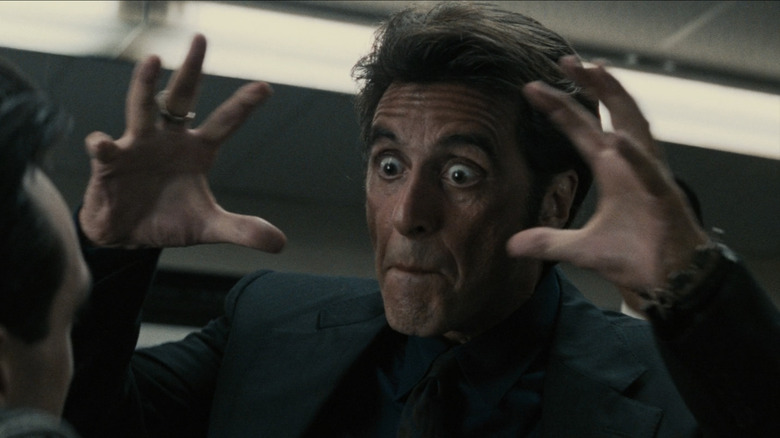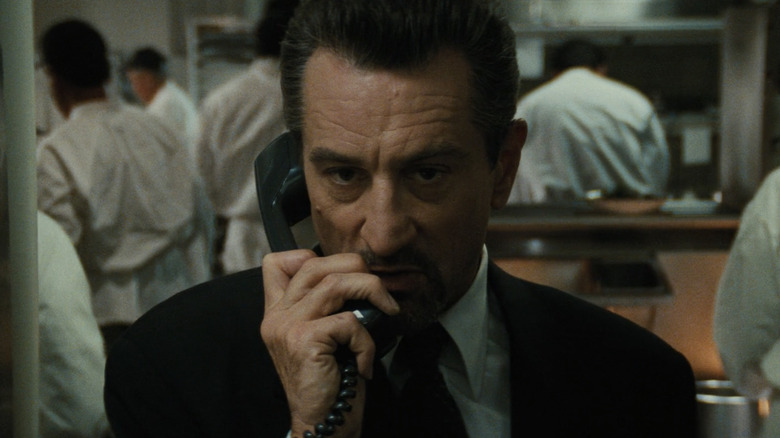Michael Mann Had A Hard Time Getting Heat To The Big Screen
You would be hard-pressed to find a crime movie made since 1995 that in some way is not completely indebted to "Heat." From "The Dark Knight" to "Den of Thieves," the influence of "Heat" in popular cinema is unmistakable. This nearly three-hour magnum opus from the king of emotionally closed-off tough guys, Michael Mann, plays on such a grand scale that it becomes operatic. Every set piece pummels you with a flurry of bullets and bombast. There are so many characters, and each one is being propelled in their own directions. At the center of it all are Al Pacino and Robert De Niro, the cop and the criminal, playing two sides of the same coin: obsessive, methodical men who only know how to do their jobs. All these years later, Mann's film is as electric as ever, perhaps even more so as this story on this scale is rarely afforded the opportunity to even get made. Nowadays, this elaborate crime story would only be able to find an outlet in one place: television.
TV loves crime shows. They can't get enough of them. Cops, criminals, and lawyers fill up airspace on major networks, basic cable, premium cable, and streaming at a near-constant basis. From police procedurals to true crime documentary series, crime television programs are everywhere. This is not a new trend in the slightest. Crime TV goes back to when shows were first being broadcast. Michael Mann is more than aware of this, as he helped create one of the definitive crime TV shows of all time with "Miami Vice." The thing is ... "Heat" had a life before it hit theaters on December 15, 1995, and it was on NBC on August 27, 1989. On that day, though, it was called "L.A. Takedown."
From failed pilot to hit movie
According to an interview with Michael Mann for the BBC, he first started writing "Heat" in the late 1970s. As the final work is already this ambitions, somewhat unwieldy film, you can imagine what the initial conception of the screenplay was. After making his directorial debut "Thief," Mann pulled the script back out and reached out to "The Warriors" and "48 Hrs." director Water Hill to direct it. He declined. Later on into the 1980s, Mann had become entrenched in television and was given the opportunity to make a pilot for NBC. That's when he pulled back out the screenplay for "Heat." Mann says of the translation to the new format, "I abridged it. Severely. I extracted, probably, something like 110 pages from the 180 pages." Cutting 70 pages out of a screenplay will certainly hamstrung it. NBC passed on the pilot but decided to air it as a television movie instead. That movie became "L.A. Takedown."
"L.A. Takedown" is not very good. Three hours can barely contain all the story and character threads of the piece. At 90 minutes, it doesn't work at all. Also, it does not have the benefit of unbelievable casting. Scott Plank starred as Detective Vincent Hanna, the role Al Pacino would go on to play, and Alex McArthur as the criminal Patrick McLaren (renamed to Neil McCauley when Robert De Niro took on the part). Look, it's a little unfair to compare these two jobbing actors to two of the greatest movie stars to ever live, but the truth is having people of the stature and command that De Niro and Pacino bring to any project they work on is crucial in buying these guys as leaders and formidable individuals. Plank and McArthur have absolutely no gravitas, and if you don't care about the two central characters, how are you supposed to make an entire television show about them that would hopefully last years and years?
The TV movie did not leave much an impact, seen as somewhat of an afterthought in comparison to "Miami Vice," which had been on the air for four years at that point. Alas, in 1992, Michael Mann would make what was up until that point the biggest hit of his career, "The Last of the Mohicans." This was an R-rated historical drama that took in over $75 million at the box office and was critically lauded. Coming off of a picture with that much juice, he decided to pull out that "Heat" script once again and give it another whirl. This time, he brought on his two massive stars, as well as a more modern star in Val Kilmer, and could finally do "Heat" the way he had always intended. Instead of the 19-day shoot of "L.A. Takedown," he had 107 days to make "Heat," a shooting schedule people would kill to have now. Every storyline had proper time to gestate, and the set pieces had money behind them.
The end result is a crime movie masterpiece. Had he been able to make "Heat" back in the early 1980s, there is no chance he would have been able to tackle something this grand when he had that little experience and what would have been less money. Mann needed to ruminate on the project for nearly 20 years so he could get it absolutely right, and he had a wonderful test ride with "L.A. Takedown" to know what not to do. Of course, Michael Mann would return to bringing back an old television project for the big screen in2006 with "Miami Vice," another exceptional picture. In that interview, Mann says, "I would much prefer to direct, maybe, two films in three years or three films in three years," but obviously, that development time is crucial for Michael Mann to make a Michael Mann film. And we would not have it any other way.

